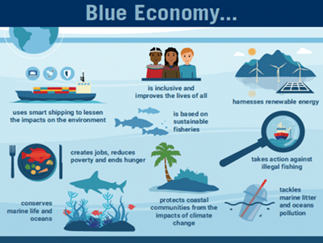

Context
A new study suggests that blue food sourced from aquatic environments can help reduce nutritional deficiencies and contribute to employment and export revenue in India.
What is Blue Food?
- Blue food is food derived from aquatic animals, plants or algaethat are caught or cultivated in freshwater and marine environments.
- Significance:
- Key Source of Nutrient:
- Blue foodsare important for the economies, livelihoods, nutritional security, and cultures of people in many countries.
- They supply protein to over 2 billion people,are a key source of nutrients in many coastal, rural and indigenous communities, and support the livelihoods of over 800 million people, the majority of whom work in small-scale systems.
- Low Emission and Tackle Deficiencies:
- They generate lower emissionscompared to terrestrial meat.
- Aquatic foodscan also be used to address B12 and omega-3 deficiencies in India.
- Over 91% of countries with vitamin B12 deficienciesalso show high levels of omega-3 deficiency
- Reduce Cardiovascular Diseases:
- Promoting blue foods over red meat overconsumption could address health and environmental concerns for about 82% of the 22 countries suffering from a high cardiovascular disease
- Revenue Potential for Global South:
- Blue foods can help improve nutrition, livelihoods or national revenuefor the global south and indigenous communities in the global north.
- Key Source of Nutrient:
Issues Associated with Blue Food:
- Bycatch:This refers to the accidental capture of non-target species in fishing nets, which can lead to the death of these animals.
- Pollution:The presence of pollutants such as heavy metals, PCBs and microplastics in the ocean can affect the quality and safety of seafood.
- Mislabelling and Fraud:There have been instances of mislabelling of seafood products, where a cheaper fish is sold as a more expensive one.
- This can lead to consumer deception and potential health risks.
- Overexploitation:Almost 90% of global marine fish stocks are now fully exploited or overfished according to the World Bank, which is an issue with overfishing, illegal fishing, and other unsustainable aquatic food production.
Way Forward
- Increasing Awareness:Governments, NGOs, and the private sector should work together to increase awareness about the benefits of blue food and its potential to address malnutrition, poverty, and environmental degradation.
- Promoting Sustainable Fishing Practices:Fishing practices that are unsustainable, such as overfishing, destructive fishing methods, and bycatch, need to be addressed to ensure that fish stocks are not depleted and the marine ecosystem is protected.
- Encouraging Aquaculture:Aquaculture can be a sustainable way of producing blue food if it is done in an environmentally responsible manner.
- Governments can promote the development of sustainable aquaculture practices by providing technical assistance, training, and incentives.



